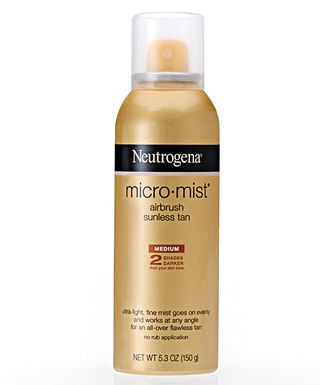Spray Tanning May Cause Lung Cancer, Warn Researchers

A number of cosmetic products, sometimes called sunless tanners or bronzers, are marketed for consumers to achieve a tanned appearance without going out in the sun or using artificial sources of ultraviolet radiation. The main ingredient in most of these sprays and lotions is dihydroxyacetone (DHA), a color additive that darkens the skin by reacting with amino acids in the skin's surface.
Because DHA has been approved by the Food and Drug Administration (FDA) for external use, spray tanning has been considered a safe alternative to sun tanning, but last year this assessment began to be challenged. An investigation conducted by ABC News in 2012 showed that DHA causes genetic mutations when applied to cells in a dish. As no studies have been conducted on humans, it remains unclear whether genetic changes would occur in people, or whether the changes would pose health risks.
"These compounds, in some cells, could actually promote the development of cancers or malignancies," Dr. Rey Panettieri, a toxicologist and lung specialist at the University of Pennsylvania. "And if that's the case then we need to be wary of them."
Panettieri, like the other scientists ABC News consulted, said more studies need to be done on spray tanning products' potential to promote lung cancer.
Regulation of Spray Tanning
The Federal Food, Drug, and Cosmetic Act (FD&C Act), Section 721, authorizes the regulation of color additives, including their uses and restrictions, in its Code of Federal Regulations (CFR).
DHA is listed in the regulations as a color additive for use in imparting color to the human body. The regulations listing DHA as a color additive require it to meet tight specifications, with strict limitations on impurities. Its use in cosmetics -- including sunless "tanning" products -- is also restricted to external application.
According to the CFR, "externally applied" cosmetics are those "applied only to external parts of the body and not to the lips or any body surface covered by mucous membrane." Additionally, color additives may not be used in cosmetics intended for use in the area of the eye unless the color additive is permitted specifically for such use; DHA is not permitted for use in the area of the eye.
Although the FDA approved DHA for external application, the use of DHA in tanning booths as an all-over spray has not been approved by the FDA since it is difficult to avoid exposure in the area of the eyes, lips, or mucous membrane, or even internally.
Tanning Booth Safety
The FDA advises asking the following questions when considering commercial facilities where DHA is applied by spraying or misting:
- Are consumers protected from exposure in the entire area of the eyes, in addition to the eyes themselves?
- Are consumers protected from exposure on the lips and all parts of the body covered by mucous membrane?
- Are consumers protected from internal exposure caused by inhaling or ingesting the product?
If the answer to any of these questions is "no," it is assumed you will not be protected from the unapproved use of DHA. If you want to use a tanning booth, FDA suggests you request measures to protect your eyes and mucous membranes and prevent inhalation, which poses the greatest risk and raises the most concerns.
"The reason I'm concerned is the deposition of the tanning agents into the lungs could really facilitate or aid systemic absorption -- that is, getting into the bloodstream," Panettieri told ABC News.
He said he believes the dose from an individual spray tan or two is likely low enough to not have a demonstrable impact on someone's health. But he would definitely "have concerns" for those who regularly spray tan, week after week.
Responsibility
FDA can only take action against firms and individuals who violate the law. Firms and individuals who market cosmetics are responsible for assuring that the products they market are properly labeled and safe when used as directed. In the case of tanning booths, generally it is the responsibility of local and state health authorities to oversee the practice of administering such products by professionals, such as in salons.
In the past, FDA has received reports from consumers claiming adverse effects from sunless tanning, including rashes and, in the case of spray tanning booths, coughing, dizziness, and fainting.



























